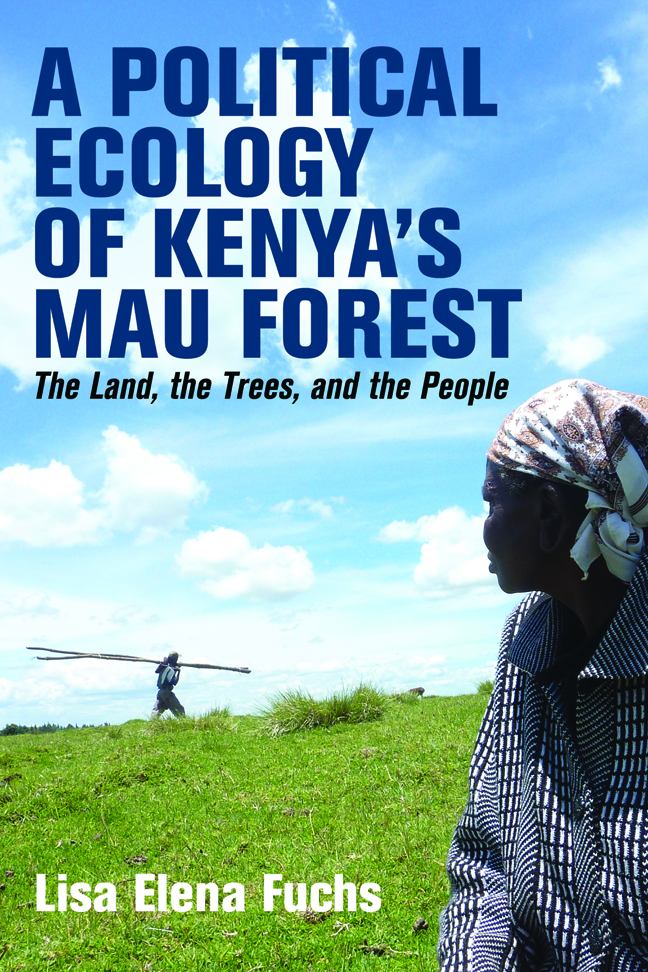Book contents
- Frontmatter
- Dedication
- Contents
- List of Illustrations
- List of Abbreviations
- Glossary
- Acknowledgements
- Introduction
- 1 The Politics of Conservation Aid: The Development State and ‘Saving the Mau’
- 2 Institutional Failure or Setting Priorities? The Continuation in Exploitation-focused Forest Management
- 3 The Political Economy of Land: Maintaining Control over Forest Land Allocation and Distribution
- 4 The Politics of Belonging and Exclusion in Response to Changes in the Eastern Mau: The Complex Definition of Legitimate Land and Resource Use
- Conclusions
- Appendix 1 Medicinal plants used and inventoried by survey respondents in the Eastern Mau in 2012–2013
- Appendix 2 Full overview of interview partners
- Bibliography
- Index
- Eastern Africa Series
- Frontmatter
- Dedication
- Contents
- List of Illustrations
- List of Abbreviations
- Glossary
- Acknowledgements
- Introduction
- 1 The Politics of Conservation Aid: The Development State and ‘Saving the Mau’
- 2 Institutional Failure or Setting Priorities? The Continuation in Exploitation-focused Forest Management
- 3 The Political Economy of Land: Maintaining Control over Forest Land Allocation and Distribution
- 4 The Politics of Belonging and Exclusion in Response to Changes in the Eastern Mau: The Complex Definition of Legitimate Land and Resource Use
- Conclusions
- Appendix 1 Medicinal plants used and inventoried by survey respondents in the Eastern Mau in 2012–2013
- Appendix 2 Full overview of interview partners
- Bibliography
- Index
- Eastern Africa Series
Summary
‘Imagine if trees gave off Wifi signals, we would be planting so many trees and we’d probably save the planet too. Too bad they only produce the oxygen we breathe’. While the origin of the quote that circulated the internet in the early 2000s is unclear, the adoption and use of the slogan by influential environmental organisations, including the World Wide Fund for Nature (WWF) and Action Against Hunger, questions society's collective approaches to complex matters. The quote itself and its popularisation through environmental organisations make manifest that there is a growing sense of concern about environmental topics, specifically climate change. However, it also shows that, despite increased awareness, we give too little attention to the urgency of doing something about it. The quote further alludes to the potential power of individuals coming together to preserve important public goods through collective action successfully. It recognises and places respon-sibility in the hands of each of us and thus individualises the duty of environmental care. However, in doing so, it also crucially neglects the structural role played by various actors and components at the system level, for instance, governments, industries, and even the very nature of the economic world order. Yet, major environmental crises of our time call for reconceptualisations at this systemic level and hence require much more than individual behaviour change.
The interconnectedness of these local and global dynamics of cause and consequence, and roles and responsibilities of various actors, is the focus of this book on the scramble for Kenya's Mau Forest. It is based on empirical findings resulting from research undertaken in the Mariashoni settlement area within the Eastern Mau Forest between 2011 and 2013. The Mau Forest's massive degradation and destruction were acknowledged when the area became a major agricultural frontier in the 1990s, following years of commercial timber extraction and conversion of indigenous forests into forest plantations. Until then, the Mau Forest was commonly profiled as the most important closed-canopy forest in Kenya and the wider East African region due to its numerous economic, environmental, and social roles. Under the considerable influence of both national and international conservation actors, the Kenyan government set out to reverse land and forest degradation in the Mau Forest in 2008.
- Type
- Chapter
- Information
- A Political Ecology of Kenya's Mau ForestThe Land, the Trees, and the People, pp. 1 - 40Publisher: Boydell & BrewerPrint publication year: 2023

